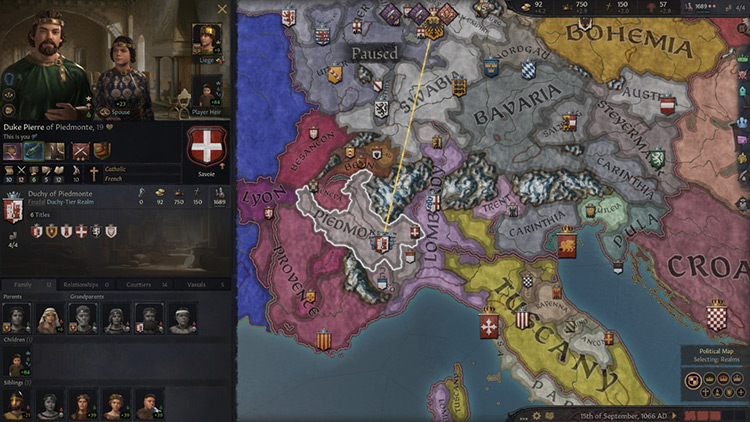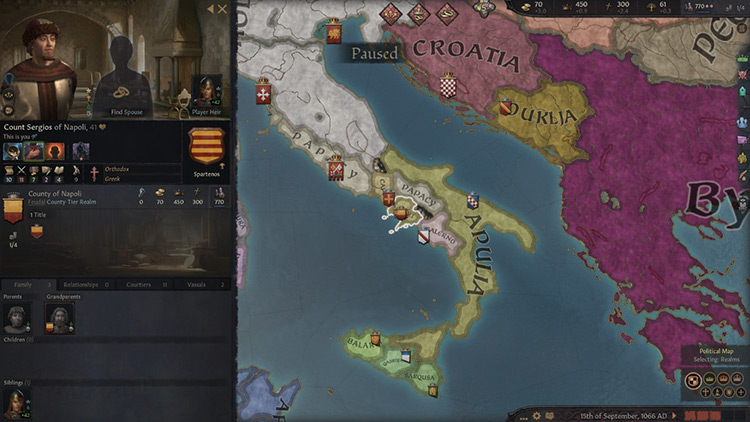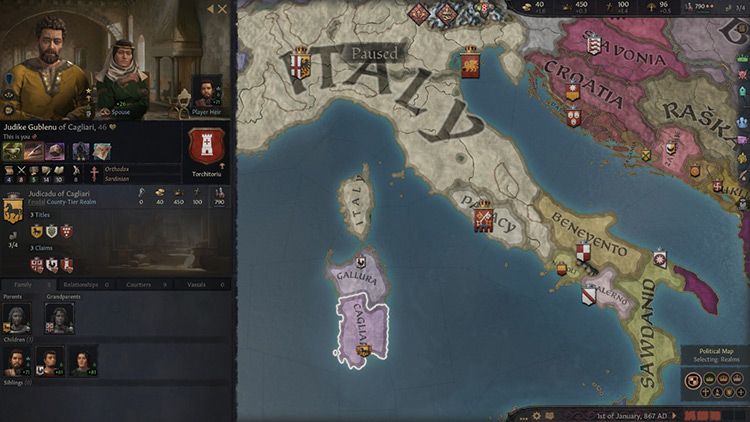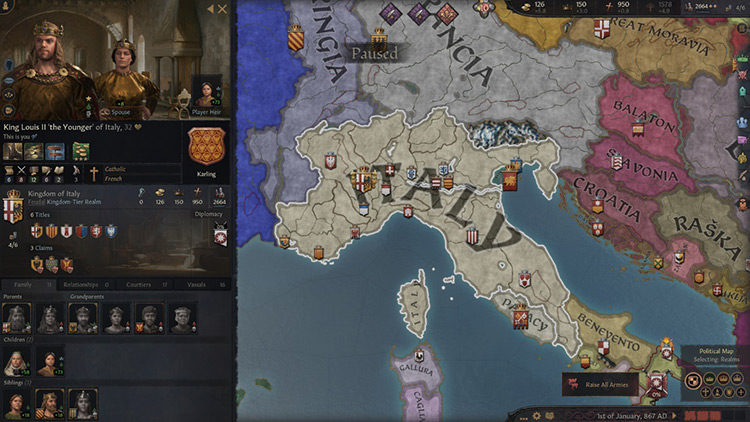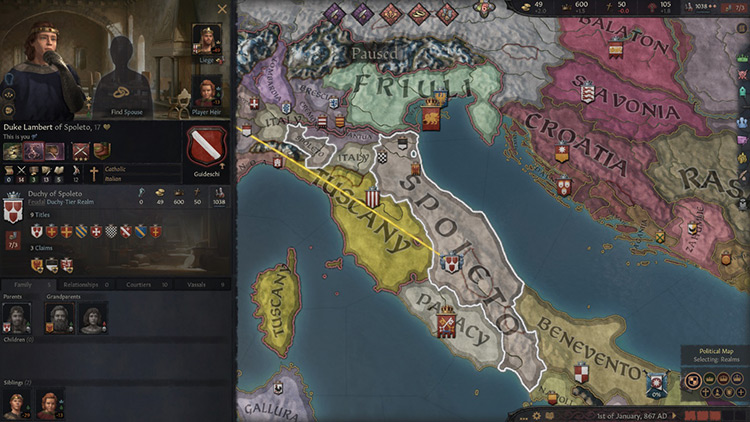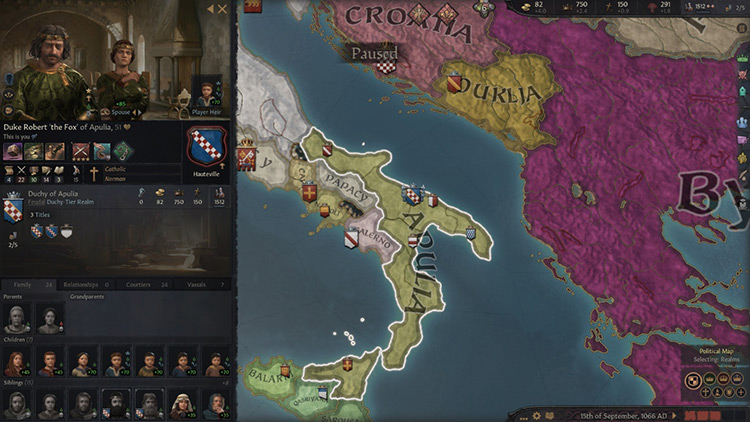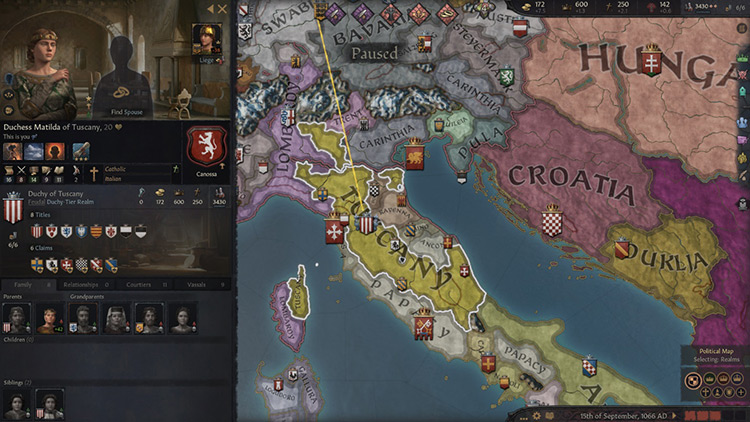While theocracies and republics are not playable (yet) without mods, the peninsula isn’t by any means short on interesting feudal characters for you to play with. The days of Roman rule are over, and Italy is dominated by foreign rulers in both starting dates. It’s up to you to adapt to the local cultures and lead a unified Italy to glory! Whether you eventually submit to the Roman Emperor in the east, stay subservient to the Holy Roman Emperors, or carve a path of your own, you’ll have a great time playing in Italy.
7. Pierre de Savoie, Duke of Piedmonte, 1066
Pierre begins the game as the duke of Savoie and Piedmonte. Savoie is essentially in France and Pierre is French himself but considering his capital in the city of Torino and the eventual fate of the de Savoie dynasty, I think it’s only proper he makes the list. For anyone who doesn’t know, the house of Savoy is the one that eventually unified the disparate Italian states and made Italy in its modern form a reality. With two consolidated duchies and being only 19 years old, you can carve yourself a realm in northern Italy and even claim the title of King in Pierre’s lifetime. Little known fact: Through complex dynastic succession rules, Pierre (through his mother) was the heir to all the Tuscan lands, and the game actually models this correctly! If you succeed in killing Matilda di Canossa, you can become the most powerful ruler in Italy very quickly. You always have the option of moving into France and claiming the Burgundian kingdom for yourself if you find it preferable! As most characters in northern Italy, you can either stay a vassal of the HRE or try your luck fighting for an independent Italy.
6. Sergios Spartenos, Count of Napoli, 1066
Sergios represents the Greek element in southern Italy, also known as Magna Grecia or “Greater Greece”. Fun fact: while the Greek culture is the largest in the game, Sergios is the only independent Greek ruler outside of the Byzantine emperor! Being a rightful vassal of the Eastern Roman empire, you can immediately declare your intent of becoming a vassal. This is recommended, as you are bound to be a target of your neighbors. You can eventually rebel and reclaim independence. The campaign offers a nice change of pace, being Orthodox and Greek surrounded by Catholics. You can attempt to restore Greek rule over southern Italy, and eventually start moving north, recreating the exploits of Belissarius. Setting up a rival Greek realm in the west and challenging the emperor in Constantinople offers a very fun and challenging campaign. Achieving it without switching culture or religion adds some extra spice to the challenge.
5. Gublenu Torchitoriu, Judike of Cagliari, 867
The Judike, essentially Count, of Cagliari in 867 is a very interesting and peculiar start. First of all, he is Orthodox and not Catholic, which can come as a surprise to most. Nominally a vassal of the Byzantine empire, he starts independent for gameplay purposes. The Sardinian culture has unique titles for characters and kingdom names for its native isles. The duchy of Sardinia is also one of the richest in the game. While sporting a below average number of counties, the unique mining settlement in Cagliari and the fact that all counties are coastal make the duchy a real money-maker. Securing all the isles in the Western Mediterranean unlocks a unique decision to form the kingdom of Baleo-Tyrrhenia. Securing the Western Mediterranean and acting as a loyal vassal of the emperor in Constantinople can make for a very interesting campaign. Embracing seafaring and piracy in the Sardinian culture can make you the terror of the Mediterranean!
4. Louis Karling, King of Italy, 867
Louis is the king of Italy in the game. Historically he was the Holy Roman Emperor as well. While his authority as emperor was mostly nominal, the in-game choice of the HRE title not existing in 867 is strictly for gameplay purposes. Louis starts in quite a precarious position. Controlling a decent domain himself, he suffers from the existence of powerful vassals in Italy. These powerful vassals need to be placated if you wish to survive. External threats are also not to be underestimated. The rest of the Karlings ruling in Europe all have claims to the kingdom of Italy and will press them at the first chance they get. You yourself need to take measures and counterstrike when possible. Remember, Louis is the rightful emperor after all! Consolidate Italy and move towards your family to the north. Restoring the Carolingian empire as the rightful heir makes for a very interesting campaign.
3. Lambert Guideschi, Duke of Spoleto, 867
Lambert, the duke of Spoleto is a personal favorite of mine. Duke of Spoleto is misleading, as Lambert is essentially controlling the entire kingdom of Romagna apart from the Papal lands. Securing independence and proclaiming yourself King is always an option. However, staying as a vassal and trying to claim your liege’s title is also an option. The preferable one, actually. The Guideschi family historically succeeded in doing exactly that. They rose to the rank of King of Italy and were even recognized as Holy Roman Emperors! The Guideschi dynasty is an old Frankish dynasty, related by blood to the ruling Carolingians. The later Salian dynasty (HRE emperors in the 1066 start) are also a part of the Guideschi dynasty. Such a historical success will be an ordeal for you to surpass. With all the tools as his disposal to rule Italy and beyond, Lambert of Spoleto is my recommendation for an 867 campaign at the heart of Italy.
2. Robert de Hauteville, Duke of Apulia, 1066
Robert “the Fox” is already past his prime in 1066. However, despite the old of his age, Robert remains one of the most interesting characters in Italy and the entire map to be honest. Having secured enough land to proclaim himself king of Sicily, Robert is in an excellent position to solidify his dynasty’s power in the region. You only need but enough money to create the Kingdom title. Conquering the nearby small realms should be a trivial endeavor. Contention with the Byzantine empire is a given. As a de jure part of the empire, you always have the option of peacefully submitting to Constantinople and expanding from within its safety. A unique achievement in fact necessitates conquering a Greek kingdom and converting it to Catholicism. This is easiest to do as a Byzantine vassal. In an excellent position to participate in the crusades, you can always achieve victory in the holy land and land a dynasty member overseas. Choosing to play as them in Jerusalem makes for a very engaging military focused campaign.
1. Matilda di Canossa, Duchess of Tuscany, 1066
The most powerful lady of the High Middle Ages could not be absent from the list. Matilda, “La Gran Contessa” as she is often called, is a long-time fan favorite since the days of CKII. Controlling the largest realm in the peninsula, Matilda finds herself in an ideal position to secure both the kingdom of Italy and Romagna. It’s possible to even create the Empire of Italia in Matilda’s lifetime if you get independence from the Holy Roman Empire. The house of Canossa historically ended with Matilda as she had no children to succeed her. As a controversial figure even to this day, she is revered for her piousness while also being accused of witchcraft. She’s rumored to also have had intimate relations with Pope Gregory at the time! Connected through her mother to the Wigeriche family in Lotharingia, Matilda can also end up with claims to the duchies up there. Your stepfather, the duke of Lower Lorraine, can be a powerful ally in the early game. Consolidate your hold over Italy and secure your dynasty’s prosperity for generations to come! Matilda historically forced the emperor to proclaim her Queen of Italy and made him beg the Pope for forgiveness outside her ancestral seat in Canossa. Can you surpass her exploits yourself?
